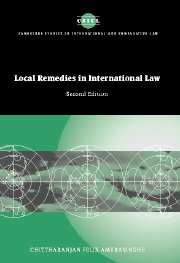Book contents
- Frontmatter
- Contents
- Preface
- Table of cases
- List of abbreviations
- Part I Prolegomena
- Part II Application of the rule
- 6 Incidence of the rule
- 7 Scope of the rule
- 8 Limitations on the rule
- 9 The rule as applied to the use of procedural resources
- 10 Waiver of the rule and estoppel
- 11 Burden of proof
- 12 Procedural matters connected with the rule
- Part III Peripheral and analogous applications of the rule
- Part IV Nature of the rule
- Part V Epilogue
- Index
- CAMBRIDGE STUDIES IN INTERNATIONAL AND COMPARATIVE LAW
11 - Burden of proof
from Part II - Application of the rule
Published online by Cambridge University Press: 03 May 2010
- Frontmatter
- Contents
- Preface
- Table of cases
- List of abbreviations
- Part I Prolegomena
- Part II Application of the rule
- 6 Incidence of the rule
- 7 Scope of the rule
- 8 Limitations on the rule
- 9 The rule as applied to the use of procedural resources
- 10 Waiver of the rule and estoppel
- 11 Burden of proof
- 12 Procedural matters connected with the rule
- Part III Peripheral and analogous applications of the rule
- Part IV Nature of the rule
- Part V Epilogue
- Index
- CAMBRIDGE STUDIES IN INTERNATIONAL AND COMPARATIVE LAW
Summary
The burden of proof in litigation relates to what must be proved and who must prove it. It is different from production of evidence. The rules relating to evidence, which concern the question of how facts may be proved, do not strictly touch on the burden of proof, although sometimes how a fact may be proved may affect what must be proved, particularly when presumptions of fact come into operation. While proof of facts and production of evidence for such proof constitute an important part of litigation even in international law, the success of a party to litigation will also depend to a large extent on the burden of proof that party carries, in so far as, if he carries the burden, he must adduce adequate evidence to prove on balance what he must prove, whereas if he does not carry the burden, the facts will be assumed to be in his favour until the other party adduces adequate evidence to prove the contrary.
In the case of the local remedies rule, it has been seen that the rule has a certain scope and that there are also certain limitations on the rule, and circumstances in which the rule is inapplicable. When the contention is raised by the respondent, as is usually the case, that the alien has not exhausted local remedies, questions arise as to the burden of proof, particularly because limitations to the rule may be pleaded, but also in relation to the actual scope of the rule.
- Type
- Chapter
- Information
- Local Remedies in International Law , pp. 280 - 292Publisher: Cambridge University PressPrint publication year: 2004



